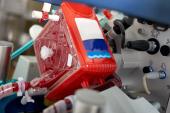RECOVER IV Impella Trial Halted in the Wake of DanGer Shock
With the first positive results from a cardiogenic-shock RCT in hand, researchers are brainstorming what should come next.

The RECOVER IV randomized trial of the Impella (Abiomed) mechanical circulatory device in patients with STEMI complicated by cardiogenic shock has been halted, its two principal investigators have told TCTMD. Participating sites were notified of the news today.
After the release of positive results from the DanGer Shock trial in April, the RECOVER IV data and safety monitoring board (DSMB) felt it was time to stop the study, said RECOVER IV investigator William O'Neill, MD (Henry Ford Health System, Detroit, MI).
“They didn’t think it was ethical to continue the trial as designed and they recommended that we terminate the trial,” said O’Neill, adding that five patients had been enrolled thus far.
Gathering randomized results in cardiogenic shock has been a long journey. In the end, though, that effort panned out—DanGer Shock showed an absolute mortality reduction of nearly 13% at 180 days with Impella CP compared with standard care, but also an increase in complications like severe bleeding and acute limb ischemia.
Much to our surprise—happy surprise but also a little dismay—the results came out being strikingly positive. William O'Neill
Embarking on RECOVER IV, the trialists weren’t certain what they’d see from DanGer Shock, said O’Neill, but had the idea that if they did a US-based trial there would be better chance of “absolute scientific proof” showing whether Impella worked.
“Much to our surprise—happy surprise but also a little dismay—the results came out being strikingly positive. The study is really bulletproof,” he said, noting that the DanGer Shock findings are “equally as powerful as the results of the PARTNER 1b trial, which is the study that validated the use of TAVR in aortic stenosis.”
Navin Kapur, MD (Tufts Medical Center, Boston, MA), the other co-PI of RECOVER IV, told TCTMD that “an immense amount of work has gone into RECOVER IV.” When DanGer Shock came out in favor of Impella in LV dominant STEMI, “that really caused a splash” due to it being the first-ever positive RCT in cardiogenic shock and having a design not all that different from RECOVER IV, he added.
“There was a lot of discussion about whether there’s equipoise, and that conversation was actually still ongoing amongst clinicians in the community,” said Kapur. The DSMB, however, which meets at regular intervals, felt that there wasn’t. “Once the DSMB says that, it makes it very difficult to continue the trial—the responsible thing to do is notify the sites.”
Indeed, after DanGer Shock was released, O’Neill said, “there was a great deal of concern amongst the investigators as to whether or not they could randomize. . . . I think that when a patient is dying in front of you, you want to throw the kitchen sink at them.”
I think there are many unanswered questions that we can pursue. Navin Kapur
O’Neill predicted reception to the RECOVER IV news would be mixed depending on who’s being asked. “If you’re a trialist, you want as many trials as possible,” he noted. “But if you’re a doctor who’s putting in the catheter and treating the patients, I think you’re relieved.”
This isn’t the end of Impella trials, however. “For sure the company is committed to doing a randomized trial. I think the steering committee is getting input from the clinicians in the field and will talk over trial design,” O’Neill said, but the key will be improving upon the results of DanGer Shock through better protocols or new devices.
Kapur agreed that cardiogenic-shock research won’t stall. “If anything, this should create more momentum for additional RCTs to now explore the space,” he said, noting that additional analyses will come out of DanGer Shock that can inform future trials. “I think there are many unanswered questions that we can pursue.”
Rather than replicating DanGer Shock, the next big gap to fill may be other disease states beyond myocardial infarction, particularly shock that occurs with out-of-hospital cardiac arrest and heart failure, said Kapur.
Caitlin E. Cox is Executive Editor of TCTMD and Associate Director, Editorial Content at the Cardiovascular Research Foundation. She produces the…
Read Full Bio




Comments